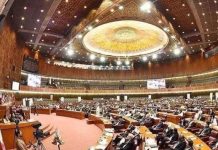The 27th amendment is reported to target further judicial reform: the creation of a separate constitutional court, transferring jurisdiction over certain matters from the Supreme Court, and giving the executive greater authority over magistrates and judicial staffing
Bureau Report
KARACHI, NOV 3 /DNA/ – PPP Chairman Bilawal Bhutto Zardari, has disclosed that the PML leader headed by Prime Minister Shehbaz Sharif had met with the President Asif Zardari requesting his support on the proposed 27th amendment.
According to the PML-N side, the amendment proposal includes several key components: the establishment of a new constitutional court, wide executive magistrate authority, transfer of judges across jurisdictions, removal of protections for the provincial share in the National Finance Commission (NFC) Award, several amendments to existing constitutional provisions for the judiciary and provinces
Both Bilawal and Asif Ali Zardari listened to the PML-N demands and are expected to take the matter back to PPP leadership for deliberation. The meeting signals renewed momentum behind constitutional reform after the controversial 26th amendment. Bilawal has convened meeting of the CEC on November 6 to further discuss this matter.
The 26th amendment, passed in 2024, introduced major changes in judicial appointment processes, including changing how the Chief Justice of Pakistan is selected.
The 27th amendment is reported to target further judicial reform: the creation of a separate constitutional court, transferring jurisdiction over certain matters from the Supreme Court, and giving the executive greater authority over magistrates and judicial staffing.
It also touches on provincial-federal financial issues: altering the NFC Award structure and potentially impacting the guaranteed provincial shares, a matter long sensitive in Pakistan’s federal governance context.
Bilawal has repeatedly dismissed rumours of a finalized 27th amendment, stating that no minister or official has formally approached him or the PPP on this.
He emphasised that the 26th amendment was achieved through consensus and compromise, and that the PPP wanted a constitutional court but accepted a constitutional bench for wider agreement.
On NFC Award issues, he has argued that provincial shares cannot be reduced, and that a new award must reflect the post-18th amendment reality of greater provincial responsibility.
If the PML-N secures PPP support, the 27th amendment could be tabled in Parliament fairly soon. Its passage would mark a significant shift in Pakistan’s judicial-federal architecture.
However, given PPP’s public caution and insistence on consensus, there may be delays or demands for substantial safeguards—especially to protect provincial rights and judicial independence.
Lawyers’ bodies and opposition parties have already expressed concern that such changes risk undermining the independence of the judiciary. Provincial governments and parties may push back if they perceive the reforms as diminishing their share of resources or powers.
The next few weeks will be critical: PPP leadership is expected to consult internally and with coalition partners before committing to the PML-N’s proposal. Draft language of the amendment has not yet been publicly shared, which means further negotiation and public consultation may still lie ahead.

















